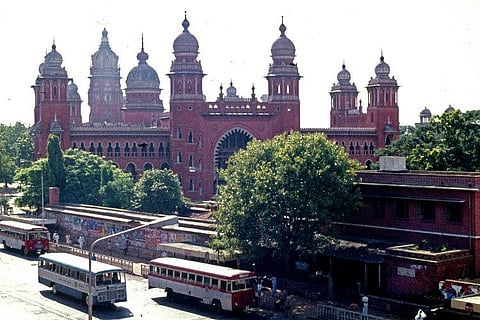

The Madras High Court has passionately argued for grant of citizenship to 65 Tamils who fled Sri Lanka after the 1983 riots, saying the conditions in the Tamil Nadu camp in which they are housed are "hellish".
The Tamils crossed the narrow strip of sea dividing Sri Lanka and Tamil Nadu way back with a view to make India their permanent home but the Centre has refused to give them citizenship all these years.
They have been engaged in a legal battle for more than two decades. Although the Indian government has promised not to deport them, it has not acceded to their demand for Indian citizenship.
Last week, the Madras High Court passed an order on their plea urging the Centre to take a sympathetic view on the plight of the petitioners and relax the norms for them to acquire Indian citizenship.
The refugees do get monthly cash doles, ration, essential commodities, accommodation, dress materials, utensils and free education.
On the issue of citizenship, the Tamil Nadu government contends that they arrived through an illegal route and so their refugee status cannot be converted into citizenship. The Centre has a similar view.
The petitioners claim they are descendants of indentured labourers who settled down in Sri Lanka's tea estates during the colonial era, they are Tamil speaking and their forefathers hailed from Tamil Nadu.
Justice G.R. Swaminathan observed: "An illegal migrant cannot claim such a relaxation if he had merged with society surreptitiously. That is not the case here. The writ petitioners have been housed in camps set up by the government."
The court drew the Centre's attention on the circumstances which forced the petitioners to seek asylum in India and consider their case on humanitarian grounds.
"A person who is running for his life cannot obviously be expected to wait for a visa. Therefore, viewing the petitioners' case through the prism of the technical requirements of law does not appear to be a humanitarian approach," observed the court.
The refugees contended before the court that the Centre had already given an undertaking that they would not be compulsorily sent back to Sri Lanka.
Observing the peculiar situation of the petitioners, the court said: "They have come away from Sri Lanka but they have not been absorbed here...
"The camp conditions are hellish. One must read Pathinathan who is associated with the literary magazine 'Kalachuvadu' in this regard. Even if one's heart is made of stone, it would still melt under the searing heat of reality.
"When IPS officers are made in-charge of Mandapam camp, it is called as punishment posting."
The court expressed its willingness to help the petitioners but consciously refrained from crossing the judicial boundary.
"This is because citizenship falls within the exclusive executive domain of the central government. My heart may bleed for the petitioners but I have to be mindful of the Lakshman Rekha that limits the bounds of judicial powers. Going beyond will be encroachment", the judge observed.
The court drew attention to Article 21 of the Constitution.
"The petitioners have been in camps for close to 35 years. Keeping them under surveillance and severely restricted conditions and in a state of statelessness for such a long period certainly offends their right under Article 21 of the Constitution of India."
Tens of thousands of Tamils fled Sri Lanka, mainly by boats, in the wake of the 1983 anti-Tamil riots which triggered a militancy that lasted for a quarter century before being crushed in May 2009.
While scores of refugees eventually went on to settle in Western countries, many found roots in Tamil Nadu, making refugee camps set up by the government their home. Yet many others found shelter with friends and relatives in Tamil Nadu.
The mass sentiments in favour of the refugees after they fled Sri Lanka diminished once the Tamil Tigers took on the Indian Army in the island nation and following the 1991 assassination of former Indian Prime Minister Rajiv Gandhi by a Tamil suicide bomber near Chennai.